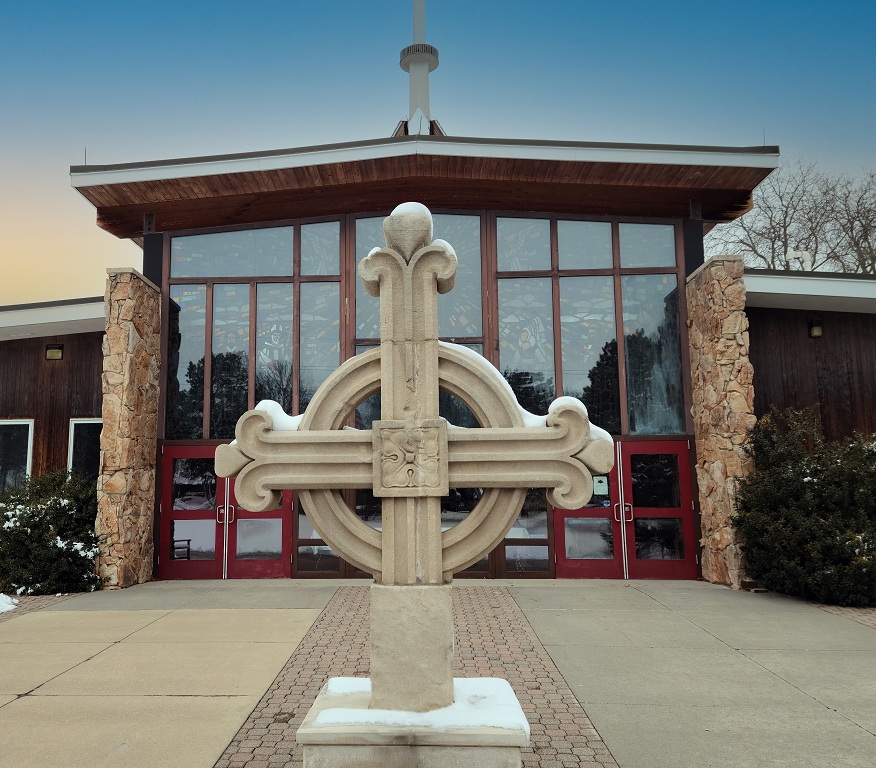When Jesus saw the crowds, he had compassion on them (Matt 9:36a)
June 14th, 2020
Lisa and
the kids make fun of me because our house is sort of like that scene in
Disney’s Fantasia in the Sorcerer’s Apprentice segment, where Mickey has stolen
the magician’s hat and conjured up hundreds, maybe thousands of brooms and
buckets to clean up the water, and they’re everywhere, out of control, running
amok—only at our house it’s not brooms—it’s my books. They’re everywhere, out
of control, running amok. I love books. One of my favorites I found many years
ago at a used bookstore in Iowa. It’s called Crabb’s English Synonymes,
and it was first published in 1816; my copy is the “new” revised edition from
1917. This book is not exactly a dictionary and not exactly a thesaurus; its
goal is to explore the subtle and sometimes very important nuanced differences in
words we commonly use in a similar way. I’d like to do that sort of exploration
with you now.
In today’s Gospel reading from Matthew chapter 9, we hear that “when Jesus saw the crowds, he had compassion on them” (v36). We hear this again in chapter 14: “Jesus saw a great crowd; and he had compassion on them” (v14), and in chapter 15: “Then Jesus called his disciples to him and said, “I have compassion for the crowd” (v32).
The word
“Compassion” means “to suffer with.” Crabb says that compassion is a moral
feeling which makes us enter into the distress of others. We can sympathize
with others, without essentially doing anything—but if we feel compassion, we
naturally turn our thoughts towards relieving their distress. “Pity” is another
similar sentiment, also unaccompanied by action. The Good Samaritan had compassion
on the traveler who fell among thieves, and so he saved him; the priest and the
Levite only pitied him, and they walked on by. Pity might sometimes be tender, but
pity is so closely allied to contempt and even sometimes disgust that none of
us wants to be the subject of it, since it can never be awakened except by some
circumstance of inferiority in the one pitied. Compassion is a response, in
solidarity and understanding, of one member of the human family toward another
member of the human family…of brothers and sisters for each other…Compassion is
something that is “awakened” in us as we realized, as John Donne, Anglican
priest and Dean of St. Paul’s Cathedral in London wrote in the 1600’s:
Each man's death
diminishes me,
For I am involved in
mankind.
Therefore, send not to
know
For whom the bell
tolls,
It tolls for thee.
Jesus
sees the crowds, and he is not numb to their needs—he has compassion for them; he
suffers with them. Having compassion, Jesus is moved to take concrete actions
in response. And in addition to his own mission and ministry of healing and
feeding and preaching, Jesus calls his
disciples to mission and ministry, too. “The harvest is plentiful, but the
laborers are few,” we hear him say today. And he summons his disciples and go
out and proclaim the Good News that the Kingdom of Heaven has come near, and to
cure the sick and cast out demons. In the passages from chapters 14 and 15 that
I mentioned earlier, Jesus summons his apostles to feed the hungry crowds.
The use
of the word “apostles” in chapter 10 verse 2 today is the first time the
disciples are called “Apostles” in Matthew. It literally means “those who are
sent out.” They are imperfect people: tax collectors and fishermen and militant
zealots and deniers and betrayers…like us…and yet they are called out and
commissioned and given authority and sent out to do service in the world, to
minister to the broken and hungry crowds, who are like sheep without a
shepherd…to tell them and show them that they now have a shepherd—Jesus
the Compassionate One.
What does
the Compassionate One have to say to us, I wonder? I wish, instead of an old rubber
“What Would Jesus Do?” bracelet, I had a “What Would Jesus Do?” Magic Eight Ball
instead…something that you could look into and get an answer…something that
would show Jesus’ words to us…
In the
Bible, the words Jesus had to say to the Apostles were pretty clear: “Proclaim
the Good News: ‘The Kingdom of Heaven has come near.’ Cure the sick, raise the
dead, cleanse the lepers, cast out demons (v7)…
We are Jesus’ Apostles now; we
are the ones who are sent out into the world to proclaim the Good News that the
Kingdom of Heaven has come near. We are the ones who are seeing crowds
gathering daily, right now. Crowds that are hurting, crowds hungry for justice
and equal treatment. What does Jesus the Compassionate One find in our hearts? Does
Jesus find pity: pitiful hearts that feel sorry for what happened to children
like Trayvon Martin and to youth like James Skurlock and to women like Breonna
Taylor and to men like George Floyd—pitiful hearts that feel sorry and then
move on? Or does Jesus find, in just a corner of our hearts maybe, contempt?
Crabb says that contempt is the cousin of pity. Does Jesus find just a hint of
contempt for these crowds who disrupt our commute, and sometimes disrupt our
peace, because, after so long, they are desperate to be heard and seen, desperate
for their suffering to be shown some com-passion, desperate for some suffering-with
and life-giving action?
Or, does
Jesus find compassion in our hearts—The compassion he had for the crowds
he encountered, that led him to feed then, and heal then, and lift them up—the
compassion he has for all the world—for me, and for you—that led him to journey
to Jerusalem and death on the Cross. True compassion will cause us to enter
into the distress of others, to acknowledge their cries for help and
justice, and to take action to relieve their pain.
The
Kingdom of Heaven has come near, and we are sent out as Apostles. There is much
sickness to be cured right now, in our bodies, in our minds, and in our
society. “Cure the sick,” Jesus says. There are hundreds of years of the
unjustly murdered dead whose children are crying out for their stories to be
told and for the hatred and evil that put them prematurely in the grave to be
overthrown. “Raise the dead,” Jesus says. There are demons of racism and
hateful speech and divisive rhetoric that are tearing our communities apart. “Cast
out demons,” Jesus says.
In our
Romans reading today Paul rejoices that, “God's love has been poured into our
hearts through the Holy Spirit that has been given to us” (5:5). My prayer for
us all is that this love that has been poured into our hearts will wash over and
wash away all contempt, and all pity, leaving only compassion. My prayer is
that, following our Compassionate Savior, we will be moved to have compassion, to
suffer-with, and that compassion will drive us to action. Amen.





Comments
Post a Comment